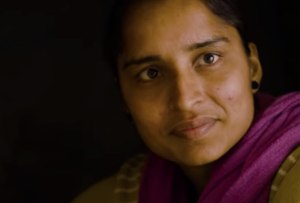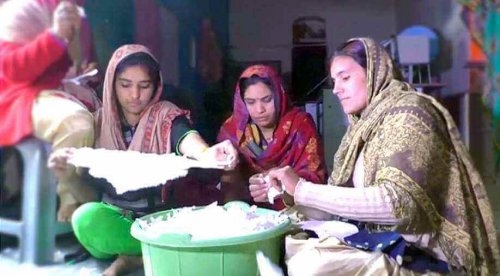Period. End of Sentence: Revolutionary Women in India


Reviewed and approved by the psychologist Sergio De Dios González
In this article, we’re going to talk about a great documentary that premiered on Netflix recently. Period. End of Sentence tells us about the customs, stereotypes, stigmas, and taboos that still surround the lives of women in India today.
It’s about a taboo that many movements in India are fighting to eliminate: female menstruation. Although it’s considered normal in the Western world, it’s still one of the biggest barriers a woman faces in India. And often in inconceivable ways.
Even though it’s one of the most basic female aspects, people have concealed, criticized, and demonized it for centuries. The good news is that, in India, a group of women has found a way to change the views of the world on something so intrinsically feminine as menstruation.
A Silent Fight
This documentary takes place in a rural area of Hapur, India, near Delhi. Without a doubt, there’s a female revolution in India. However, rural areas still hold on to past customs. And some traditions still enslave these people to their past. For example, women are still condemned to domestic life and arranged marriages. Likewise, they drop out of their schools to only become mothers with no other futures.
Very recently, some women from a small community in Hapur began a silent revolution against the stigma that’s deeply rooted in their culture. Menstruation in Indian culture is taboo. Today, women have decided to lay the foundations of their awakening.
Sanitary towels became a part of the Indian market only recently. Since you can only find them in big cities, sanitary towels are practically inaccessible for most women due to how expensive they are. The Pad project turned an old semi-abandoned house in Hapur into a factory where women of all ages make their own sanitary towels, which they also sell in stores.
By doing so, they’ve come up with a way to solve a problem that in most cases was a major obstacle to most women’s goals. They’ve created a collaborative association where women get economic compensation for their work. For many, it’s the first time they’ve received payment in their lives.
Menstruation and Abandoning Studies
Probably the most serious problem that the stigma on menstruation for women in India poses is that many women still drop out of school when they get their first period.
In fact, this is an ancient tradition that marks the point in which women begin their period of fertility. Therefore, they must abandon everything else to marry and have children. People in India still consider periods shameful and disgraceful. Many women consider themselves impure, which prevents them from entering and praying at temples. In fact, this even happens in temples that are consecrated to feminine deities. That’s the absurdity of this stigma.
Although many women in India find a way to flee early marriages through their education, many leave school on their own due to menstruation. Many times, they don’t have adequate places to change. All of them use rags or pieces of cloth that they bury after using. Again, it’s something they can’t do in schools comfortably or privately.

The Pad Project and Women in India
The idea for the Pad project was born in the city of Los Angeles. This non-profit organization raised the necessary funds for the first 99% biodegradable sanitary towel machine that the Hapur woman association set up.
The economic empowerment it has given these women has been substantial. It’s helped provide income for these women and their families. But it’s also had two notable side effects. First, the women have earned the respect of the men in their community. Second, it’s helped pay for the education of younger women.
Their brand of sanitary towels is called Fly. They chose this symbolic name due to their project’s goal: to let women in India finally spread their wings and fly.
Overcoming Ignorance
The stigma surrounding menstruation in India is synonymous with ignorance. The documentary shows young men from Hapur who don’t know what menstruation is. Some think it’s a disease that attacks more women than men.
For many of the men in the area, this project has allowed them to stop being ignorant and know the feminine and masculine world a bit better. The women of the Pad project hope to eliminate the stigma surrounding menstruation someday.
A project so simple and so accessible captured everyone’s attention. It caused a peaceful revolution and filled women with the hope that the ignorance and stereotypes that have existed for centuries will end.
In this article, we’re going to talk about a great documentary that premiered on Netflix recently. Period. End of Sentence tells us about the customs, stereotypes, stigmas, and taboos that still surround the lives of women in India today.
It’s about a taboo that many movements in India are fighting to eliminate: female menstruation. Although it’s considered normal in the Western world, it’s still one of the biggest barriers a woman faces in India. And often in inconceivable ways.
Even though it’s one of the most basic female aspects, people have concealed, criticized, and demonized it for centuries. The good news is that, in India, a group of women has found a way to change the views of the world on something so intrinsically feminine as menstruation.
A Silent Fight
This documentary takes place in a rural area of Hapur, India, near Delhi. Without a doubt, there’s a female revolution in India. However, rural areas still hold on to past customs. And some traditions still enslave these people to their past. For example, women are still condemned to domestic life and arranged marriages. Likewise, they drop out of their schools to only become mothers with no other futures.
Very recently, some women from a small community in Hapur began a silent revolution against the stigma that’s deeply rooted in their culture. Menstruation in Indian culture is taboo. Today, women have decided to lay the foundations of their awakening.
Sanitary towels became a part of the Indian market only recently. Since you can only find them in big cities, sanitary towels are practically inaccessible for most women due to how expensive they are. The Pad project turned an old semi-abandoned house in Hapur into a factory where women of all ages make their own sanitary towels, which they also sell in stores.
By doing so, they’ve come up with a way to solve a problem that in most cases was a major obstacle to most women’s goals. They’ve created a collaborative association where women get economic compensation for their work. For many, it’s the first time they’ve received payment in their lives.
Menstruation and Abandoning Studies
Probably the most serious problem that the stigma on menstruation for women in India poses is that many women still drop out of school when they get their first period.
In fact, this is an ancient tradition that marks the point in which women begin their period of fertility. Therefore, they must abandon everything else to marry and have children. People in India still consider periods shameful and disgraceful. Many women consider themselves impure, which prevents them from entering and praying at temples. In fact, this even happens in temples that are consecrated to feminine deities. That’s the absurdity of this stigma.
Although many women in India find a way to flee early marriages through their education, many leave school on their own due to menstruation. Many times, they don’t have adequate places to change. All of them use rags or pieces of cloth that they bury after using. Again, it’s something they can’t do in schools comfortably or privately.

The Pad Project and Women in India
The idea for the Pad project was born in the city of Los Angeles. This non-profit organization raised the necessary funds for the first 99% biodegradable sanitary towel machine that the Hapur woman association set up.
The economic empowerment it has given these women has been substantial. It’s helped provide income for these women and their families. But it’s also had two notable side effects. First, the women have earned the respect of the men in their community. Second, it’s helped pay for the education of younger women.
Their brand of sanitary towels is called Fly. They chose this symbolic name due to their project’s goal: to let women in India finally spread their wings and fly.
Overcoming Ignorance
The stigma surrounding menstruation in India is synonymous with ignorance. The documentary shows young men from Hapur who don’t know what menstruation is. Some think it’s a disease that attacks more women than men.
For many of the men in the area, this project has allowed them to stop being ignorant and know the feminine and masculine world a bit better. The women of the Pad project hope to eliminate the stigma surrounding menstruation someday.
A project so simple and so accessible captured everyone’s attention. It caused a peaceful revolution and filled women with the hope that the ignorance and stereotypes that have existed for centuries will end.
This text is provided for informational purposes only and does not replace consultation with a professional. If in doubt, consult your specialist.







